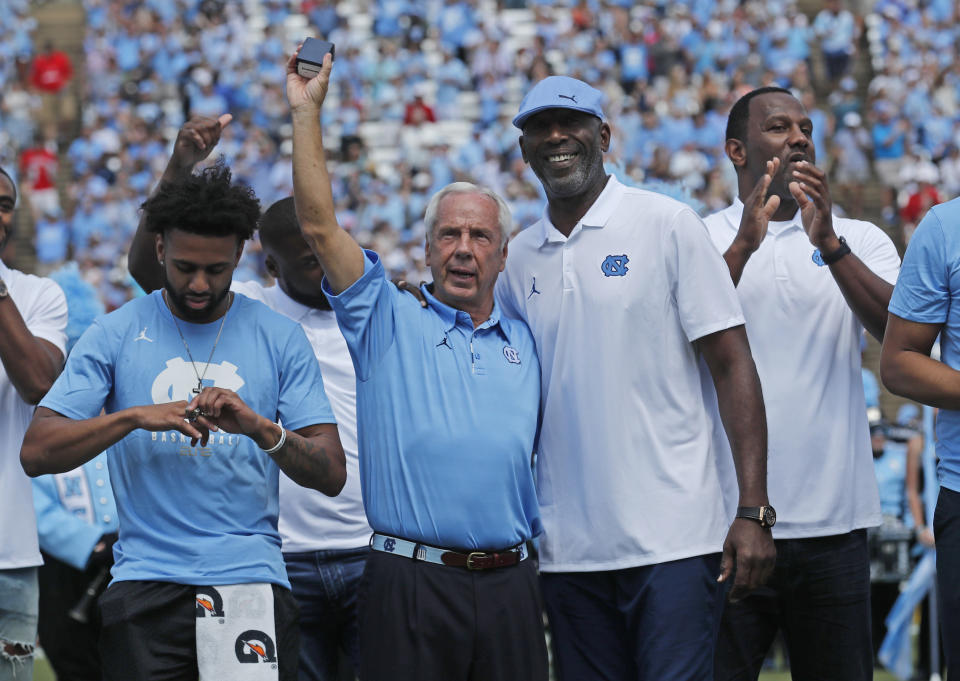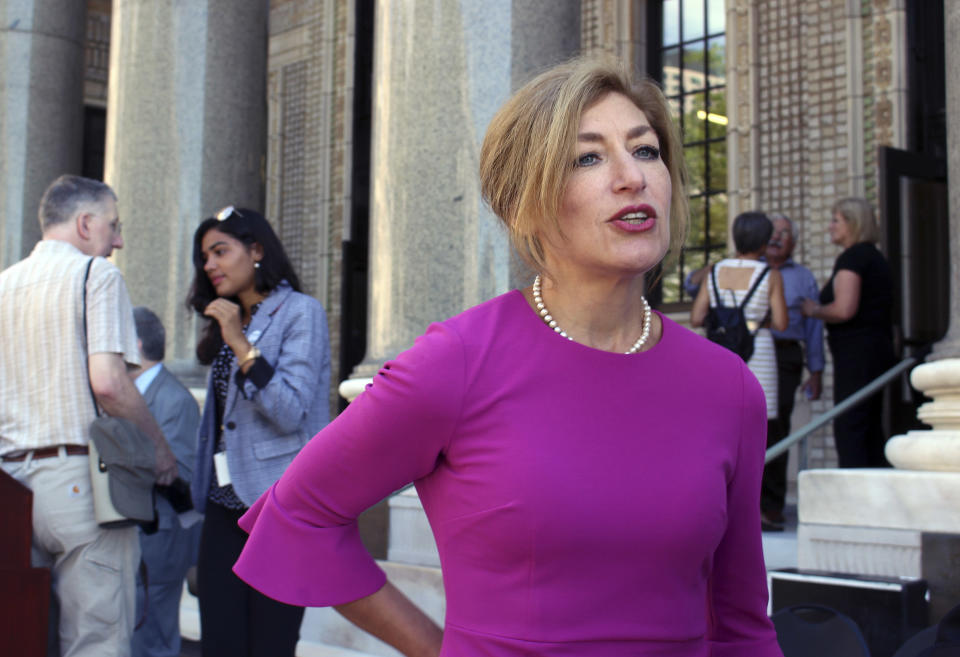Roy Williams has 'amnesia' when it comes to college basketball's seedy underworld
College basketball is attempting to regain its footing from last week’s federal probe that resulted in the arrest of 10 men, including sneaker executives, an AAU coach, sports agents, financial planners and four assistant coaches from major programs. There are almost universal calls for discussion and reform, as many publicly acknowledge the long-standing reality of the sport.
“We’ve had this underworld as part of the fabric [of college basketball] for a long, long time,” Notre Dame coach Mike Brey told the Indianapolis Star. “A long, long time.”
Yet not everyone appears to agree. University of Connecticut president Susan Herbst said “nothing like that” could occur at her school. And North Carolina coach Roy Williams told ESPN the scandal “was just a shock to me.”
“They’ve never helped me get any player, never insinuated, never done anything,” Williams said of his relationship with Nike. Williams built a Hall of Fame career coaching at Nike schools Kansas (1988-2003) and UNC (2003-present). “We never even discuss things like that. So I know it’s foreign to me.”

In Kansas City, where 17 years ago federal prosecutors gained a guilty plea from AAU coach Myron Piggie in a scandal that involved top recruits, Nike, sports agents and a prominent University of Kansas booster, the U.S. Attorney who handled the case wonders how anyone could doubt history is repeating itself.
“No person that close to the events in 1999 could or should miss the significance of that investigation and the relevancy to today,” said Stephen L. Hill, now a partner at the Kansas City branch of the global law firm Dentons.
“Our April of 2000 indictment outlining the conspiracy laid out everything in detail and was closely covered by local and national media,” Hill told Yahoo Sports. “Mr. Piggie’s May of 2000 guilty plea was also well covered and documented the scheme. I can’t imagine any coach not following those events closely.”
Or, as Piggie put it on Tuesday when he heard of Williams’ quotes:
“Well, that’s [expletive],” Piggie told Yahoo Sports. “I mean, come on. Come on. You know Roy knew. He was in the mix. He knew what was going on. Roy’s got amnesia.”
When asked by Yahoo Sports for clarification, UNC spokesman Steve Kirschner said the “shock” Williams expressed came from the explosive nature of the story. “He was shocked that last Tuesday he came to work and heard about FBI informants and wiretaps and coaches getting arrested,” Kirschner said. “It was out of the blue that this story came out. I think that’s the shock we all had. Unless you had knowledge of the FBI investigation, I’d say last Tuesday shocked everyone.”
In 2000, Piggie pleaded guilty to a federal felony charge of mail and wire fraud after running the Children’s Mercy Hospital 76ers, a powerhouse AAU team full of some of the best players in the Midwest. Nike, a Kansas booster and multiple sports agents funded the operation. The feds said Piggie funneled $35,500 to his players, which included top recruits JaRon and Kareem Rush, Corey Maggette and Korleone Young.
“Piggie admitted that he used his players to obtain a total of $420,401 from various sources, including $184,435 in salary and team sponsorship money from Kansas City area booster Tom Grant, $159,866 from the Nike Corporation and $76,100 from sports agents Jerome Stanley and Kevin Poston,” the feds said when announcing the plea deal.
Piggie said prosecutors offered him probation if, as part of his guilty plea, he would name names in college basketball and extend the investigation to the programs involved with his heavily recruited players.
A tough-minded former drug dealer, Piggie, then 39, refused to cooperate. He instead served 37 months in federal prisons in Kansas and Arkansas to maintain what he deemed his self-respect by not snitching, even if it was just on college athletics.
“That’s the street code,” Piggie told Yahoo Sports. “I couldn’t do that. [That’s] not how I was brought up.”
His secrets remained secrets. He knows them, though.
Kansas was never cited for wrongdoing in ensuing NCAA cases, but the Jayhawks, just up the road in Lawrence, recruited a number of the players and had direct ties to the program through Grant. JaRon Rush was verbally committed to the program for a stretch, and Piggie noted that Williams recruited players directly through him.
The case is a near duplicate of the current scandal. Yet some in college basketball continue to sound oblivious.
“This is a whole different level we’re talking about here,” Williams told ESPN. “This is a different level that should have some people being scared to death.”
Herbst, from UConn, declared such problems simply couldn’t exist in her basketball program.
“We have nothing like that here,” Herbst said in an interview with Inside High Education. “I know the program thoroughly. I have an athletics director who is very hands-on. Basketball isn’t hard to know; they are very small, intimate programs, and it would be difficult to hide much in most of them … if your AD is paying attention, isn’t on the road too much.”
Herbst was appointed UConn president in December of 2010, and watched the fallout of an NCAA case where Josh Nochimson, a former UConn team manager turned registered sports agent, was sued by one of the program’s best players, then-NBA star Richard Hamilton, for stealing $1 million from him. Nochimson then helped UConn coaches broker the recruitment of prized talent Nate Miles. Nochimson provided Miles with housing, meals, strength and conditioning classes, training and even surgery on his foot.
Miles enrolled but never played for UConn. He was expelled for violating a restraining order in a domestic violence case. In 2011 the NCAA stripped the school of scholarships, placed it on three years probation and suspended then-coach Jim Calhoun for three games. Calhoun retired in 2012, but the idea that “nothing like that” could occur anywhere, let alone a place where it occurred in the past decade, is beyond naïve.

As long as industry leaders attempt to ignore or dismiss the reality of how college basketball recruiting works, the problem will just continue.
Part of the current case includes sports agents working side deals with assistant coaches for help steering players to them as future clients, the kind of arrangement rooted in the desire for additional money and something no one would go tell their athletic director about. Those deals could extend to anyone around the program who has a relationship with a potential NBA draft pick – support staff, student managers and even teammates. As long as humans are involved in the sport, every school is susceptible.
Piggie said he doesn’t know how any coach could claim ignorance as to how the system works because the system has been the system for more than a generation. After all, JaRon Rush’s son, Shea, is currently playing for Williams as a walk-on at UNC.
While not every kid is involved in violations, Piggie says it’s improbable that any high-level program is completely clean in the recruitment of the very best players.
“You aren’t getting great players unless you’re paying,” Piggie said. “Someone is going to drop some money somewhere. That’s the name of the game.”
He at least expects college coaches to acknowledge how their business works. He cited the comments this week from Duke Coach Mike Krzyzewski, who called for reform.
“We don’t have a good model, a model that fits what’s happening in basketball, so college basketball’s going to have problems,” Krzyzewski acknowledged to ESPN. “Before these kids ever come to us, we are not the only ones recruiting these youngsters. Talent is being recruited all the time in every shape and form.”
“I have a lot of respect for K saying, basically, that college basketball is a circle and we’re trying to pound it into a square,” Piggie said. “Who’s paying these coaches? Shoe companies. Nike. Adidas. You’re being paid $2.5 million a year, you know what’s going on. You have to.”
As for Williams, Piggie said if he doesn’t know now, it’s because he forgot.
“Roy knew what was happening,” Piggie said. “In 1997, 1998, 1999, he knew what was happening because he was in the middle of it. These college coaches … come on.”
Until there is agreement that this is a widespread problem, history is likely to keep repeating itself.
More from Yahoo Sports:
• How the Yankees bullpen pulled off a wild-card miracle
• Mark Cuban considering a presidential run
• Soccer star apologizes for ‘rowdy’ incident at Disney World
• Coach kicks players off team for protest
